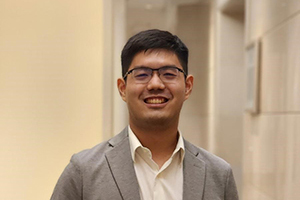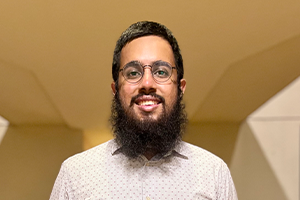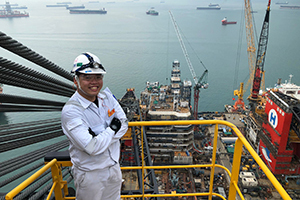Why OSE?
- A unique diploma that covers naval architecture with a focus on sustainability, decarbonisation and renewable energy that prepares you for careers in the marine and offshore engineering sector, and exciting opportunities in clean and renewable energy such as offshore wind
- Learn about essential digital skills used in AI and data analytics to give you an edge in managing marine operations and processes
- Apply for prestigious MaritimeONE Scholarships that cover tuition fees and allowances
- Enjoy advanced standing for Naval Architecture & Marine Engineering degree with SIT-Newcastle University and related degrees with local or overseas universities
About OSE
With the growing importance of sustainability, the marine and offshore sector presents new and exciting career opportunities! Set sail on your ‘green’ sea adventure with our Diploma in Offshore & Sustainable Engineering (OSE).
You will get trained in naval architecture and marine engineering, with a green focus on sustainability, decarbonisation and renewable energy. Through OSE, you will gain expertise in designing and building offshore vessels and structures. By delving into crucial areas of green technology – such as low-carbon and green-fuelled systems, as well as hydrogen infrastructure – you will gain the knowledge needed for careers in the sustainable engineering sector. With offshore wind identified as a key sector for sustainable energy growth in Singapore and Asia, OSE will give you a head start in this emerging field.
Moreover, the course will hone your knowledge in Artificial Intelligence (AI) applications, including autonomous vessels. You will also learn about essential digital skills, such as data analytics for technical operations and processes.
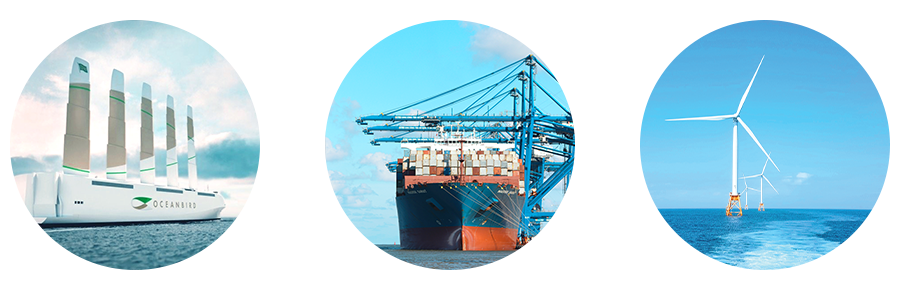
Work on Industry-based Projects
Our strong emphasis on industry-based projects will
give you an edge in creating innovative solutions for
using clean energy, developing new materials and
processes, as well as designing and building marine
vessels and offshore structures.
In your final year, you may undertake a capstone
project focusing on conventional energy, new energy,
renewables, or decarbonisation solutions. There will
be opportunities for you to work with students from
other engineering disciplines to solve real-world
problems related to the marine and offshore industry
Local and Overseas Industry Exposure
Broaden your experience with the Industry
Immersion Pathway, which offers two options: a
one-year internship for in-depth, hands-on exposure
to industry practices, or a one-year project to
address real-world challenges. Alternatively, choose
a six-month internship with leading companies such
as the Association of Singapore Marine & Offshore
Energy Industries (ASMI), Dyna-Mac Holdings,
and Seatrium Limited. There are also opportunities
for you to go on overseas study trips to sharpen
your global perspective! What’s more, our industry
partners offer attractive scholarships covering tuition
fees and allowances for your diploma.
Overview of Your OSE Journey
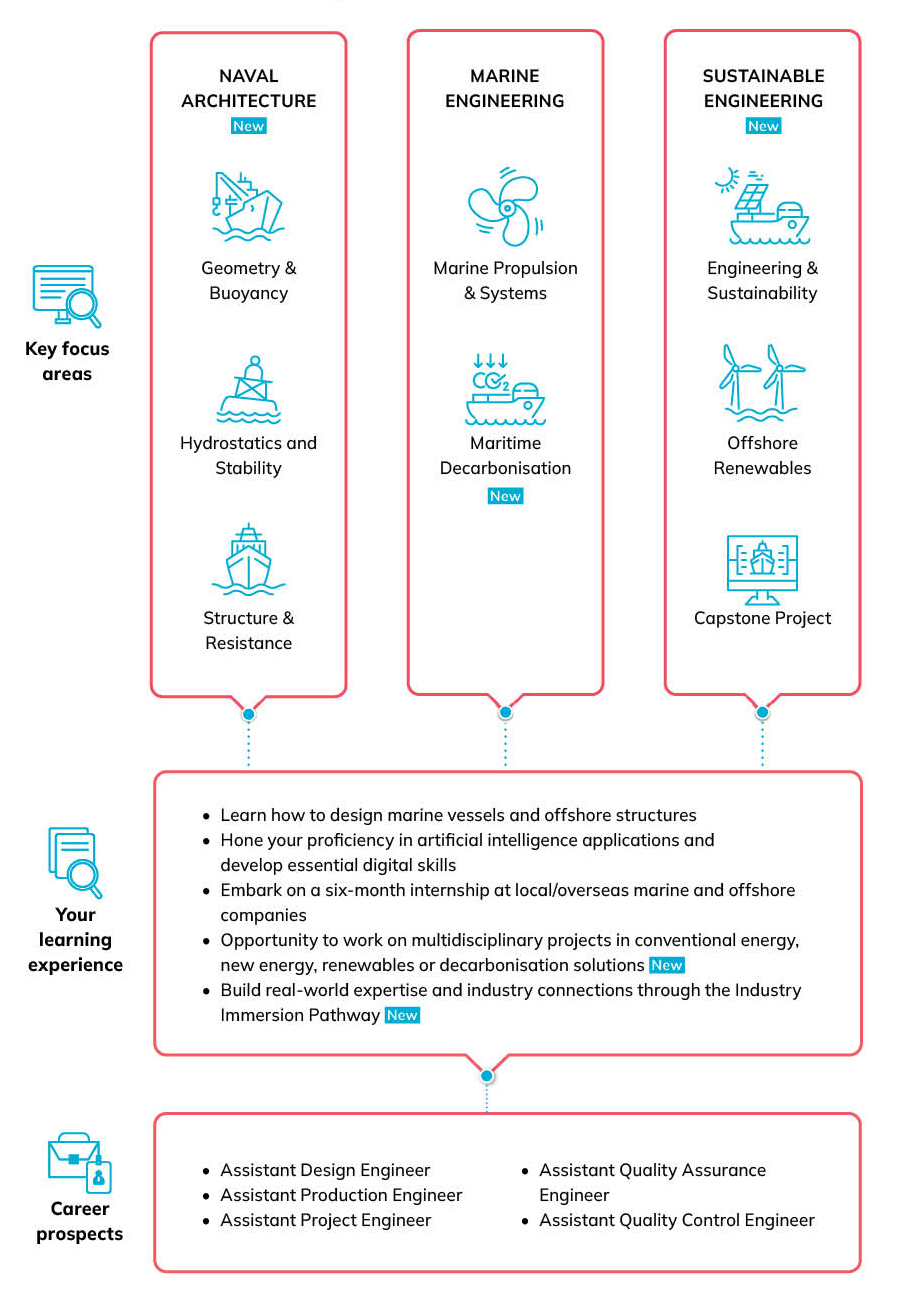
Further Studies
Accredited by the Institute of Marine Engineering Science & Technology (UK), this diploma gives you the opportunity to improve your prospects by pursuing a related degree programme at a local or an overseas university. You can also enjoy advanced standing at these universities:
Singapore
– Nanyang Technological University
– National University of Singapore
Australia
– University of Sydney
– University of Tasmania
United Kingdom
– Newcastle University
– University of Glasgow
– University of Strathclyde
Together with Newcastle University, the Singapore Institute of Technology offers you the chance to pursue a prestigious Bachelor of Engineering with Honours in Naval Architecture and Marine Engineering degree programme.
Careers
Pursue a career in the design, survey, production, safety, and research and development areas of the marine and offshore industries. You can look forward to pursuing careers in these job roles:
- Assistant Design Engineer
- Assistant Production Engineer
- Assistant Quality Assurance Engineer
- Assistant Quality Control Engineer
- Assistant Project Engineer
Entry Requirements
AGGREGATE TYPE ELR2B2-C
To be eligible for consideration, candidates must have the following GCE ‘O’ Level examination (or equivalent) results.
| Subject | 'O' Level Grade |
|---|---|
| English Language | 1-7 |
| Additional Mathematics/Mathematics | 1-6 |
| Any one of the following subjects: Biology Biotechnology Chemistry Computing/Computer Studies Design & Technology Electronics/Fundamentals of Electronics Physics Science (Chemistry , Biology) Science (Physics, Biology) Science (Physics, Chemistry) | 1-6 |
Applicants must also fulfil the aggregate computation requirements for the ELR2B2-C Aggregate Type ( English Language, 2 relevant subjects and 2 other best subjects) listed at www.np.edu.sg/docs/ELR2B2.pdf .
For students with other qualifications, please refer to the NP website for the entry requirements and admissions exercise period.
Candidates with severe vision deficiency, profound hearing deficiency, uncontrolled epilepsy and/or severe physical impairments may encounter difficulties meeting the course requirements and expectations.
What You Will Learn
Mechanical Engineering Fundamentals
This module introduces students to the study of external forces in two dimensions and their effect on particles and rigid bodies that are at rest and at simple linear motion. Students
learn the knowledge and skills to analyze the forces acting on the bodies by drawing free-body diagrams and applying the conditions of equilibrium. This module also aims to equip students with the skills to analyze problems of rigid bodies in two dimensions
linear motion. Topics include forces and resultants, moments and couples, equilibrium, plane friction, kinematics and kinetics of linear motion.
Electrical Engineering Fundamentals
This module provides a foundation in electricity
covering basic concepts of electrical circuits and the methods used to analyse them. The module emphasises the understanding of the basic electrical circuit laws (Ohm’s Law, Kirchhoff’s Voltage and Current Laws) and network theorems, and their
application to electrical network analysis. Topics covered include fundamentals of electricity, network theorems, capacitance, electromagnetic induction and inductance, AC waveform and transformer fundamentals.
Engineering Mathematics 1
This module is designed to provide students with the fundamental skills in mathematics required to solve basic engineering problems. Topics are introduced in an order that is intended to keep abreast of the application requirements in engineering
modules. The emphasis in each topic is on simple applications and problem solving. Topics include algebra, trigonometry, logarithms, plane analytic geometry, matrices and complex numbers. Throughout the module, there is appropriate use of a Computer Algebra
System.
Programming
This practice-oriented module equips students with basic knowledge and skills in computer programming using a suitable high-level language. The main topics include basic computer programming concepts and
fundamental programming constructs such as sequences, selection and repetition.
Career & Engineering Professional Preparation
This module aims to give students a head-start in their professional careers
as they transit into a polytechnic engineering education. The module will equip students with knowledge and skills that can help them chart, navigate and advance in their individual education and career pathways. Students will be guided in adopting a
design thinking approach towards making their education and career plans. They will be exposed to career-centric self-assessment tools and online resources. As part of our efforts to help students benefit from the ubiquity of a professional online presence,
students will also establish their online professional brand by showcasing their marketable knowledge, skills and competencies.
To kickstart our students personal and professional development, the module will also impart various
knowledge and skills, such as, cultural intelligence, financial literacy, digital literacy, industry networking and safety. The topic on safety will be taught according to the Competency Unit “Develop a Risk Management Implementation Plan”
from the Singapore Workforce Skills Qualifications (WSQ) National Competency Standard. To augment this qualification, students will participate in industry engagements and service projects to glean the importance of safety in the engineering profession
and societal context.
Innovation Made Possible^
This module aims to help students discover and hone their innate ability to think creatively and come up with innovations to tackle problems close to their hearts. Underpinned
by the Design Thinking framework, students will be sensitised to the process of user-centric problem solving. They will be introduced to concepts such as empathy, problem-definition, ideation, prototyping and testing through a practical approach featuring
engaging out-of-classroom activities, just-in-time master-classes and a hands-on, “learning by doing” delivery format. Ultimately, the module will help students recognise that innovation is attainable and fun and develop creative confidence
to explore new ideas in their studies and beyond.
^Critical Core modules account for 13 credit units of the diploma curriculum. They include modules in communication, innovation
and world issues, as well as an interdisciplinary project. By bringing students from diverse diplomas together, the interdisciplinary
project fosters collaboration to explore and propose solutions for real-world problems. NP aims to develop students to be agile
and self-directed learners, ready for the future workplace.
Engineering Mathematics 2
This module is designed to provide students with the fundamental skills in mathematics required to solve basic engineering problems. Topics are introduced in an order that is intended to keep abreast
of the application requirements in engineering modules. The emphasis in each topic is on simple applications and problem solving. Topics include remainder and factor theorems, trigonometry, differentiation and simple integration with applications.
Engineering Drafting
This module covers the fundamentals of engineering drawings utilised in vessel design and construction. Students will learn commands of the software, common drawing language and standards, drawing interpretation
and key considerations in producing 2D drawings. Through the module, students will also produce engineering drawings of various disciplines, gain practical experience using AutoCAD, an industry-standard engineering drafting software, and learn about digital
drawing management.
Thermofluids
Thermofluids will provide students with a fundamental understanding of the 2 broad studies of fluid mechanics and thermodynamics. Students will learn the basic laws governing the behaviour of fluids
under the influence of various energy transfer.
Topics include systems concept, temperature and pressure, fluid statics, fluid in motion, continuity equation, laminar and turbulent flows, ideal incompressible flow, Bernoulli’s equation,
the first law of thermodynamics, properties of perfect gas and non-flow process with perfect gas. Students will also go through a simple case study of turbomachinery: pumps. By applying the thermofluid concepts, solve, understand and perform basic sizing
for pumps.
Geometry and Buoyancy
This module introduces the world of marine and offshore, where students delve into the fundamental principles of vessel construction and floatation. The basic vessel types, layout and key components
of vessel geometry in relation to design will be covered. Students will be taught to interpret drawings employed in the vessel design and construction process, such as lines plan, general arrangement and structural drawings.
Confident
Communication: Find Your Voice^
This module is designed to empower students to become thoughtful and confident communicators, while discovering their personal voice in self-expression. It equips students with the skills to communicate
with impact in a variety of settings, by tailoring their message to suit audience, purpose and context. Students will learn how to utilise storytelling structures and techniques, persuasive strategies and effective visuals to connect meaningfully with
their audience. The module also features a personalised growth plan that enables students to customise their learning experience according to their individual needs and aspirations. Peer learning and coaching circles provide students the platform to practise
their critical reasoning and presentation skills in a safe environment. Ultimately, the module encourages students to reflect on their communication habits and develop practical strategies to enhance their effectiveness as communicators.
Health
& Wellness^
This module provides students with an opportunity to be active, keep fit and stay healthy through basic sports skill acquisition. It also aims to enhance student’s social and psychological well-being through
a variety of sports electives while taking them through the process of character development, choice and decision making.
^Critical Core modules account for 13 credit units of the diploma curriculum. They include modules in communication, innovation
and world issues, as well as an interdisciplinary project. By bringing students from diverse diplomas together, the interdisciplinary
project fosters collaboration to explore and propose solutions for real-world problems. NP aims to develop students to be agile
and self-directed learners, ready for the future workplace.
Project Management
This module covers the various methods and processes involved in planning and scheduling for major engineering projects in a marine environment. The key topics are critical path method, earned valued method,
work breakdown structure, resource management and cost and schedule control.
Marine Engineering Systems
This module aims to provide students with a broad understanding of marine piping systems, basic ventilation
systems and auxiliary machineries including static and rotating equipment onboard ships through hands-on practices on common marine equipment such as valves, strainers, pumps, heat exchangers and diesel engines (including dual-fuel engines using cleaner
fuel); and their applications in marine systems design and operations.
Hydrostatics and Stability
This module aims to equip students with a solid foundation in vessel hydrostatics, covering essential insights into
intact stability, large angle stability, as well as trim and damage stability of vessels. Additionally, the principles and analysis of centroids, relating to areas, volumes, and mass, will be thoroughly explored for diverse types of floating platforms
and vessels.
Strength of Materials
This module aims to provide students with the foundational knowledge of strength of materials with emphasis on applications and problem solving. It introduces to students the methods
in the calculation of stresses and strains in various structural members such as beams, columns and shafts. Taking into account the material properties, students would then be able to apply the methods to predict the response of a structure under
loading. Topics include simple stresses and strains, torsion in shaft, shear force and bending moment diagrams, stresses in beams, combined stresses and experimental stress analysis.
Offshore Topside Systems
This module
aims to provide students with a broad overview of the world’s current and transitional energy trends. It covers the engineering concepts, practices and operations on various floating platforms such as FPSO, FLNG and FSRU. Students will gain
a deeper understanding of the engineering design and working principles of the offshore topside systems’ process plant, equipment and utilities in upstream oil, gas and LNG processing.
World Issues - A Singapore Perspective^
This module will expose students to a wide range of global issues discussed in the context of Singapore as a nation state. Students will be guided to critically examine current affairs from various perspectives and develop an appreciation of the
dynamism behind current world problems and consider possible solutions. The intent of this module is to develop thinking students with well-considered perspectives who are able to articulate reasonable opinions, make thoughtful decisions and informed
choices as active citizens in society. They will also be exposed to a multidisciplinary approach in the mitigation of global challenges and thus be adequately prepared to handle Year 3 IS interdisciplinary Project ID.
^Critical Core modules account for 13 credit units of the diploma curriculum. They include modules in communication, innovation
and world issues, as well as an interdisciplinary project. By bringing students from diverse diplomas together, the interdisciplinary
project fosters collaboration to explore and propose solutions for real-world problems. NP aims to develop students to be agile
and self-directed learners, ready for the future workplace.
Marine Propulsion Systems
This module aims to provide students with the fundamental knowledge and understanding of marine propulsion systems, matching of engine and propeller, compressed air system for starting, steering
gear systems, reliability concepts applied to machinery design, and marine pollution control. Alternative fuel systems, hybrid propulsion, electrification and green ship technologies such as scrubbers and ballast water treatment will also be covered.
Structure & Resistance
This module aims to provide students with essential principles and analyses concerning vessel resistance and propulsion, including the concept of hull form optimisation and energy saving devices related to
Energy Efficiency Design Index (EEDI). Students will be taught to comprehensively examine structural strength using the simple beam theory analogy, leading to an optimal and ideal strength-to-weight ratio. Challenges related to vibration, maneuverability
and the intricacies of ship launching would also be covered.
Engineering & Sustainability
The module aims to introduce students to contemporary design thinking that preserves the natural environmental through a broad
overview of topic on Design for Sustainability. The module emphasises on the well-being of people and the environment as the outcome. It covers resource efficiency, use of environmentally friendly materials, innovated sustainable products and processes
through practices such as lean and green operations, remanufacturing and responsible sourcing.
Main focus of the module sets on the most dominant environmental issue which is climate change. Through the understanding of carbon footprint,
carbon emission calculation, learning of carbon negative solutions and decarbonisation efforts from industry leaders who are leading authority in sustainability domain, it helps students to gain a better understanding of the local and global engineering
industry approaches. With deep understanding of the issue and impacts, it encourages students to appreciate and apply sustainable design philosophy that will reduce negative impacts on the environment.
This module aims to provide students with the background of IMO net zero greenhouse gas emission strategy and the challenges for the pathway to net zero emission for vessel operations. It will discuss the impact of the change in regulations on future vessel designs and retrofitting of existing vessels. Topics include emission types, emission sources, vessel efficiency indexing and emission measurement, options for alternative fuels, renewable energy and energy storage systems applicable to vessels. The module will also look at current market trends IMO regulations and discuss the practicality of existing solutions and upcoming developments for implementation.
The module also explores the upcoming regulatory framework for carbon tax credit, Environmental, Social, and Corporate governance (ESG) in the shipyard during vessel construction and operation.
Offshore Wind
This module aims to provide students with general knowledge of the design considerations for offshore wind projects. Industry standards for offshore platform design will be introduced, with topics ranging from various wave theories to Morison’s theory. Motion and mooring analysis will also be introduced for offshore floating wind platforms. Overall, students will be exposed to the latest engineering concepts and practices in the design, construction and installation of offshore wind projects.
Marine Production Technology
This module aims to equip the students with knowledge in operations and advanced processes carried out in marine production and QA/QC processes throughout the entire production flow in new building
yards as well as repair and conversion yards. Marine industry safety and legislation governing occupational safety in workplaces will be covered through the introduction of the production process.
Engineering Modelling
This
module introduces 3D modelling to students using industry-specific CAD software. In this module, students would assume the role of an engineering designer to translate 2D engineering basic design into 3D modelling for detailed design, create the 3D modelling
of hull structure, pipe routing, equipment placement and components for materials optimisation and ease of constructability.
Capstone Project
This module takes students through the entire project cycle and will require
them to apply the knowledge and skills acquired in their studies in groups to solve a real problem related to the marine industry. They may be assigned projects in conventional energy, new energy, renewables and decarbonisation solutions. The students’
performance will be assessed continuously. Basic design considerations using 3D printing will also be covered.
Project ID: Connecting the Dots^
Project ID aims to prepare students for an increasingly globalised and interconnected
world where problems are multi-faceted and require interdisciplinary research and collaboration to solve. Using a project-based learning approach, students will have the opportunity to work in a multi-disciplinary team with students from across the polytechnic
to investigate and propose comprehensive recommendations for a pressing real-world problem affecting Singapore. they will be guided to step out of your disciplinary silos and effectively communicate and collaborate with peers from different backgrounds.
The module seeks to develop independent learning skills and the ability to synthesise diverse strands of knowledge to solve a complex problem, while impressing on them the importance of being a responsible global citizen.
Year-Long Internship
I
The Year-Long internship aims to enhance existing internships to enable a more structured applied-learning pathway co-supervised by company supervisors and polytechnic lecturers. Learning resources such as learning guides and taskbooks would
be purposefully designed to scaffold students’ learning throughout the year-long internship phase. The learning guides and taskbooks would cover the essential knowledge and comprise an inventory of essential on-the-job tasks designed to cover all
desired applied learning outcomes as part of the internship assessment. The contents of the learning guides and taskbooks will be jointly developed with the industry. Students would submit a final report at the end of each semester and present what they
have learned. Assessment would be conducted jointly by the school and company supervisors.
Final Year Project I
This year-long project module is designed to provide students with practical, hands-on experience while developing
skills and knowledge comparable to those gained through traditional structured modules. The module focuses on a comprehensive, real-world engineering problem or innovation challenge, which students will work on from inception to completion in that semester.
Throughout the project, students will engage in research, design, analysis, prototyping, testing, and reporting, mimicking the processes found in engineering disciplines. They will be required to apply theoretical knowledge from core subjects,
solve complex problems. The project will encourage collaboration, critical thinking, and innovative problem-solving, simulating industry practices and preparing students for professional engineering roles.
^Critical Core modules account for 13 credit units of the diploma curriculum. They include modules in communication, innovation
and world issues, as well as an interdisciplinary project. By bringing students from diverse diplomas together, the interdisciplinary
project fosters collaboration to explore and propose solutions for real-world problems. NP aims to develop students to be agile
and self-directed learners, ready for the future workplace.
6-Month Internship (Local/Overseas)
The Internship aims to provide practice-oriented training to equip students with the appropriate knowledge, management and communication skills imbued with the
right values to work as technologists in marine production. Students will get the chance to understand the organisational structure, company product and go through the work/ production flow/project with company employees. Both industry supervisors and
NP supervisors will assess students’ performance.
Final-year Project
In this module, students will design and develop a product or system related to a real-world project. In the project, students learn to apply their
knowledge and skills in creative problem-solving, engineering and design, teamwork and project management. This module focuses on identifying the problem or need, research and design. Students might be required to design, fabricate, test, and refine the
prototype and prepare the refined design and a project report. Students must also do a final presentation to a panel of examiners.
Year-Long Internship II
The Year-Long internship aims to enhance existing internships to enable a
more structured applied-learning pathway co-supervised by company supervisors and polytechnic lecturers. Learning resources such as learning guides and taskbooks would be purposefully designed to scaffold students’ learning throughout the year-long
internship phase. The learning guides and taskbooks would cover the essential knowledge and comprise an inventory of essential on-the-job tasks designed to cover all desired applied learning outcomes as part of the internship assessment. The contents
of the learning guides and taskbooks will be jointly developed with the industry. Students would submit a final report at the end of each semester and present what they have learned. Assessment would be conducted jointly by the school and company supervisors.
Final Year Project II
This year-long project module is designed to provide students with practical, hands-on experience while developing skills and knowledge comparable to those gained through traditional structured modules. The module
focuses on a comprehensive, real-world engineering problem or innovation challenge, which students will work on from inception to completion in that semester.
Throughout the project, students will engage in research, design, analysis, prototyping,
testing, and reporting, mimicking the processes found in engineering disciplines. They will be required to apply theoretical knowledge from core subjects, solve complex problems. The project will encourage collaboration, critical thinking, and innovative
problem-solving, simulating industry practices and preparing students for professional engineering roles.

